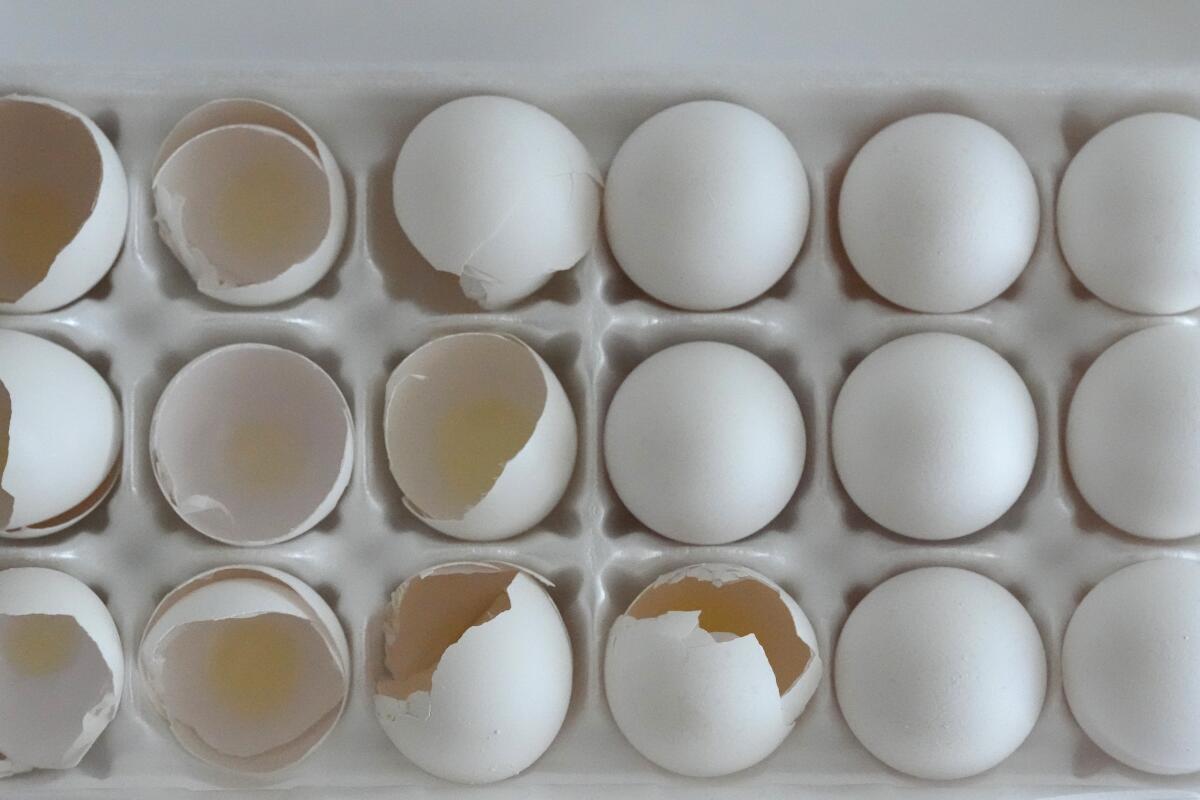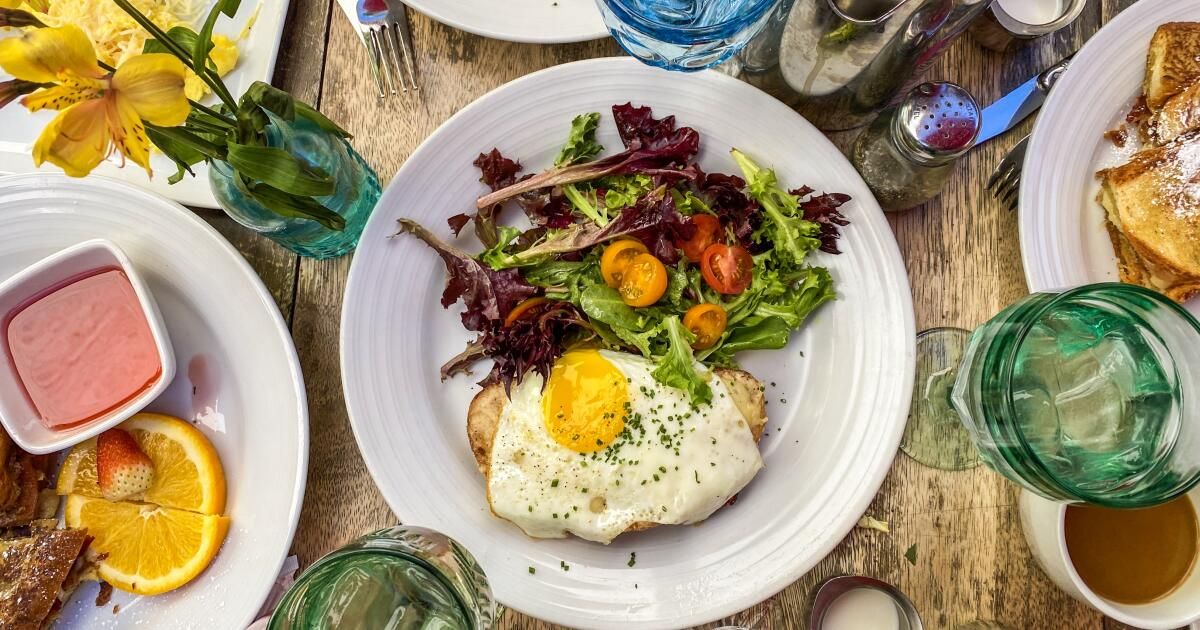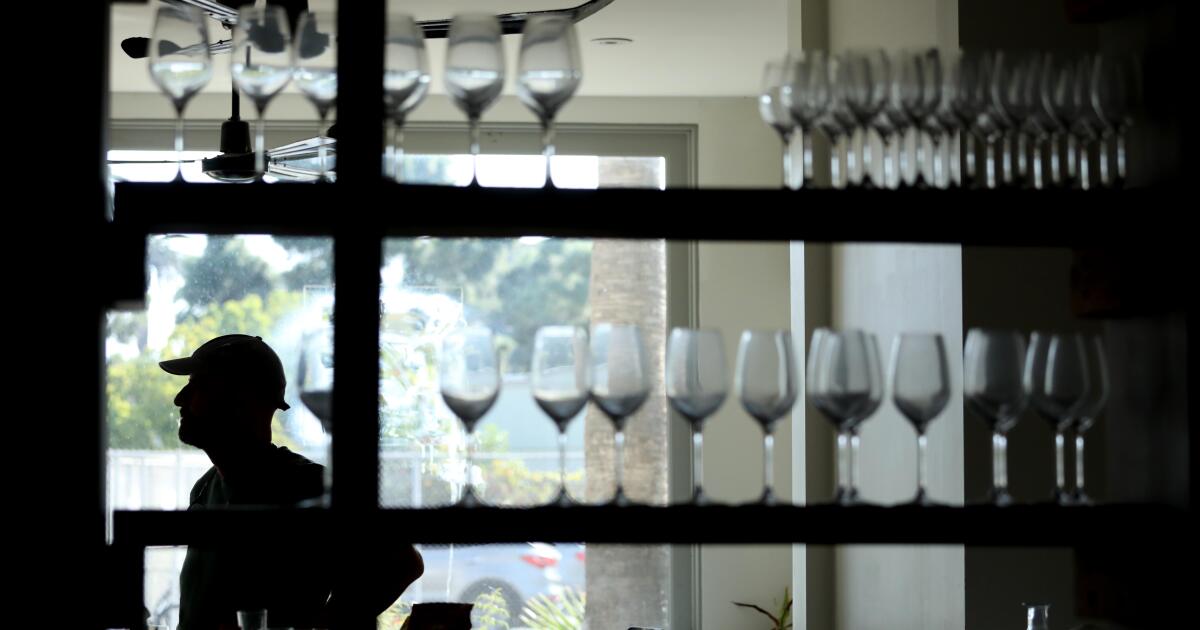The current egg shortage in California due to the spread of bird flu among livestock is posing another challenge in early 2025 for local restaurants, especially lunch spots that rely heavily on eggs for menu items.
It's also unclear how the fires that broke out Tuesday might affect eggs and other basic ingredients. But in light of tough times overall for the industry and a traditionally slow January, some restaurateurs said earlier this week that they had already been forced to raise prices for diners, or are weighing whether to do so, according to multiple interviews.
In San Luis Obispo, Philip Lang, who has operated Bon Temps Creole Café for nearly 30 years, said he raised the price of egg products on his menu just before Christmas. For example, a $15 menu item now costs $17 for two eggs.
Before the bird flu outbreak, he paid $20 for a box of 15 dozen conventional eggs. Since the bird flu, the price has continued to double, from about $50 to now about $110 per box.
“Eggs are on all our plates,” he said of his restaurant that is only open for breakfast and lunch. “We make our hollandaise with egg and egg toppings.”
He said most diners understand, but some still express disappointment.
In Irvine, eggs are included in nearly all of Burnt Crumbs' dishes, from best-selling Japanese-style soufflé pancakes to breakfast fried rice, said chef-owner Paul Cao. In an average week, Cao said his kitchen goes through between 180 and 225 dozen eggs. Cao now has to pay more than double what he did three months ago: up to $130 for a box of 15 dozen eggs.
The H5N1 strain of the bird flu virus continues to spread around the world, reducing the supply of eggs and making them more expensive and harder to find. There are no signs of relief, and scientists and health officials fear we are on the brink of another global pandemic. In California, egg prices have skyrocketed to $8.97, a 70% increase in the past month, according to the U.S. Department of Agriculture.
Cao said he has no plans to raise prices for now. “I will give you until March, first quarter of 2025, if the trend is not going in the right direction, we will have to raise prices. “We cannot continue assuming the costs,” he stated.
He's afraid of losing customers, but says he won't be able to keep up the price increase for long. “When egg prices go up two dollars a dozen, that costs us a couple thousand a month,” he said.
Chef Walter Manzke, second from left, and the kitchen team at République in Los Angeles. The restaurant, like many others, is considering raising the cost of some egg dishes as the bird flu outbreak continues to impact egg prices.
(Ron De Angelis / For The Times)
Walter Manzke, co-owner of République with his wife and partner Margarita Manzke, said he feels lucky to still be able to get good eggs from his distributor despite the shortage.
It doesn't expect to raise its menu prices just yet, but it's definitely feeling the pressure because many of its well-known dishes use eggs, including its popular French toast.
“We're just doing the best we can,” he said of the Hancock Park restaurant that last year was ranked No. 4 on the Times' 101 Best Los Angeles Restaurants guide. “Compromising on quality is not an option.”
On Friday, Delilah Snell, who operates Alta Baja Market, temporarily raised the prices of her egg dishes by $1 at her restaurant and market in Santa Ana.
Snell now pays $131 for a box of 15 dozen organic, free-range brown eggs. In October, he paid about $70. He said he might pay less for lower-quality eggs, but he doesn't “want to compromise on the quality” his customers expect.
On the counter menu of his store, he posted a sign that reads: “Over the past few weeks, our prices have gone up 40% (and continue to go up) due to bird flu. As a result, we need to add a $1 surcharge to all egg dishes to cover this expense and continue to provide you with a high-quality product.”
Once prices come down, he said, he will eliminate the surcharge.
The rise in egg prices follows a slow recovery from the COVID-19 pandemic, as many Southern California restaurants continue to struggle.
Bon Temps' Lang said there is now a notice at the top of the menu alerting customers to the temporary increase to $1 per egg.
The notice reads: “Due to the bird flu which has quadrupled the price of eggs in recent months, we find it necessary to add a surcharge of one dollar per egg to all dishes containing eggs until the price of eggs drops. We regret every time we are forced to raise any of our prices. Please note that we do not do this for profit, only to maintain our business during these difficult times. Thank you for your understanding.”
Lang said he plans to eliminate the surcharge once prices drop to about $50 for a box of 15 dozen eggs.

The cost of eggs skyrocketed 70% in the last month in California, according to the United States Department of Agriculture.
(Charles Rex Arbogast/Associated Press)
As egg prices rise, several buyers are also reporting shortages.
On Tuesday afternoon, Cao said the egg shelves at Song Hy Market in Little Saigon in Garden Grove were more than half empty. The store, known for its inexpensive groceries, was selling medium cage-free eggs for $8.99 a dozen, according to a video it provided.
Around the same time, an egg cooler at Trader Joe's in Irvine was already nearly half empty after receiving a new shipment that morning, one shopper said. A day earlier, at a nearby Costco, Cao said there was a line of at least 12 people waiting to grab a box with a dozen eggs from the half-empty shelves.
Some restaurant owners, like Jasmin González, who runs Breezy in San Juan Capistrano, have chosen to raise prices on other menu items and avoid a price increase on the restaurant's popular egg dishes.
His restaurant, which serves a Filipino-inspired brunch, will be closed for a couple of weeks for a remodel, he said, and will likely increase prices on some items once it opens, mainly on higher-margin items like coffee. That would help the restaurant offset the price of eggs and other higher costs, including the statewide minimum wage increase, he said.
Gonzalez said she doesn't feel comfortable changing the price of her $14.99 breakfast burrito, a best-seller.
“I don't want people to pay $16 or $17 for breakfast burritos,” he said. “I don't like the way it feels.”












